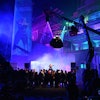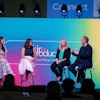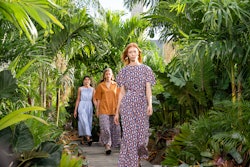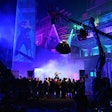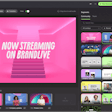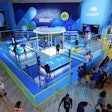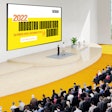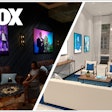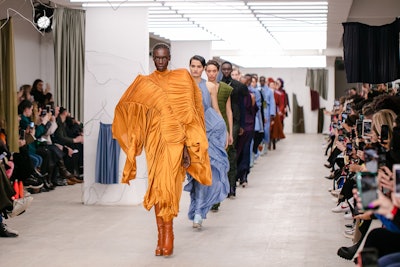
As with all recent live events due to the COVID-19 pandemic, London Fashion Week needed to be rethought. That meant trading in IRL catwalks for a creative, click-worthy design.
On June 12, the British Fashion Council (BFC) launched its new digital platform, serving as the hub for the latest virtual version of London Fashion Week. Similar to a traditional fashion week, the three-day event, which took place from June 12-14, featured a schedule of events with specifically timed moments along with 24/7-accessible content. The online space, which merges womenswear and menswear, includes virtual showrooms (powered by wholesale fashion platform Joor), panel discussions, and other interactive offerings from brands such as Charles Jeffrey, Priya Ahluwalia, Nicholas Daley, Daniel W. Fletcher, Marques Almeida, Xander Zhou, and Feng Chen Wang.
Designers were able to showcase their collections, which would normally debut on a runway or at a presentation, and link directly to their e-commerce platforms. Press and buyers could request line sheets, while consumers could listen to interviews with designers and podcasts, as well as browse photo diaries and watch short films.
Not a stranger to technology, LFW was the first international fashion week to livestream its shows. But this year was the first time the fashion week had gone purely digital. And it might forecast a new future for the fashion industry, which has faced scrutiny recently because of its out-of-sync design and production calendars and sustainability issues.
Here, Caroline Rush, chief executive of the British Fashion Council, discusses why the digital concept made sense at this moment, how the platform aims to benefit designers, and why you shouldn’t be buying a winter coat in June.
 Smartzer converted LFW videos into interactive, clickable experiences.Photo: Courtesy of Londonfashionweek.co.uk
Smartzer converted LFW videos into interactive, clickable experiences.Photo: Courtesy of Londonfashionweek.co.uk
Why did the BFC decide to produce a digital platform for LFW as opposed to postponing or canceling the event?
The global pandemic has had profound effects on our industry, and as an organization whose aim is to support designer businesses, we are doing everything we can to make sure designer businesses have what they need to survive the crisis. As an industry, we have seen incredible philanthropy through humanitarian efforts as well as companies stepping up with financial and non-financial aid for designers.
Launching a digital platform for London Fashion Week, as opposed to canceling, felt like an obvious choice at a time where the audience cannot travel or meet in large groups. It was incredibly important that we offer a platform for our designers to express themselves, tell their stories, and continue doing business. The aim was to bring the fashion community together and create a global meet-up point for designers, media, retailers, and fashion enthusiasts, allowing them to share their experiences from the last few months.
What the opportunity of going digital offers is access to the content from a much wider group of people, not only trade but also the public. The LFW platform is free and accessible to everyone, something that allows the designers and our brand partners to reach new audiences.
What are some advantages of a virtual fashion show or fashion week?
Digital has always been a part of London Fashion Week. In fact, we were the first international fashion week to livestream shows, but never before has London Fashion Week been digital-first.
A digital format can have several benefits for designers: It allows brands to reach new global audiences as the platform stays open for everyone to explore. It also allows creativity and new thinking and offers an opportunity for brands to tell a bigger story, beyond the actual clothes and collections. With less focus on the actual product, there is a new opportunity to explore the universe of the brand.
The platform was built to provide flexibility for designers to show a variety of content and to be able to integrate tech partners, existing and new. Fashion and tech companies have often worked together to facilitate new ways of doing things and amplify their stories, but the exciting developments and newness come when tech companies and creatives work together to push boundaries.
We have seen brands create digital firsts and experiences before, so it will be interesting to see how this plays out in the future. Another big benefit of digital is the ability to use data to inform what we do and understand audience behavior, which is much more difficult with physical fashion shows. There is an opportunity to expand the audience through our partners and their global reach, and to engage with a broader consumer audience and in turn help designers, especially the SME [small- and medium-sized enterprises] and start-up businesses, to engage with new customers.
How did you encourage live conversation during the event?
COVID-19 and lockdown measures around the world had a significant impact on designers [and] their ability to create, sell, and showcase their collections, therefore this season was an opportunity for them to focus on storytelling and creative content. The digital London Fashion Week platform allowed brands to establish connections with both consumer and trade audiences through live Q&As, panel discussions, and virtual parties on Instagram.
The digital event became a platform for collaboration and a forum for meaningful discussions, and also a source of inspiration for fashion enthusiasts and the future generation of fashion designers.
How was social media leveraged and incorporated into LFW?
As always, social media continues to be an important tool at London Fashion Week and a great way to promote our incredible talent to a global, engaged audience. This season, we launched a new hashtag, #LFWReset, and encouraged everyone to share their experience on social media. All content on the platform was also shareable through different platforms such as Facebook, Instagram, Twitter, and WeChat.
We have close relationships with all the main social media platforms, and they were great tools to use for some of our brand partners such as John Lewis, who created the first catwalk show with solely members of the public, asking them to post their best catwalk outfits on Instagram and compiling the best images into one video.
Another great example is Smartzer and its interactive technology, which was used to convert regular video content on YouTube into interactive and clickable experiences. Viewers were able to click on items featured in the videos to unlock a deeper in-video experience and discover the designers, with an average click-through rate from a video view to a full designer profile page of 78 percent, which is incredibly high.
Does a digital platform like this encourage more sustainable fashion and/or pan-seasonal collections?
What the recent international events have shown us is that there is an opportunity and urgent need to reset and do things differently in order to create positive change, both for our planet and for the people who work within our industry.
Taking London Fashion Week digital is an opportunity to do this and rethink the fashion cycle entirely, something that not only includes sustainability but also seasonality; a lot of retailers and designers agree that people should be shopping in store for the current season. Buying winter coats in June doesn’t make sense, and we now have the opportunity to change that, while maintaining an appetite for fashion.
Do you envision this as a viable model for fashion weeks going forward? Will you incorporate a digital platform into London Fashion Week in September, along with live shows?
The new platform [londonfashionweek.co.uk] will be “always on” and frequently updated with new content going live throughout the year. It’s important that we continue to give our designers a platform that allows storytelling, innovation, and engagement, whether it’s through a digital platform or live events.
While our hope is to have a hybrid of digital and physical events sometime in the near future, right now our priority is to guarantee the safety and well-being of everyone in our industry while we continue to plan for September. There are a lot of opportunities that we are currently exploring and focusing on, such as what tech can we bring on board to help designers even more, how can we convert a traditional trade show into entertaining and engaging content to watch from home.
